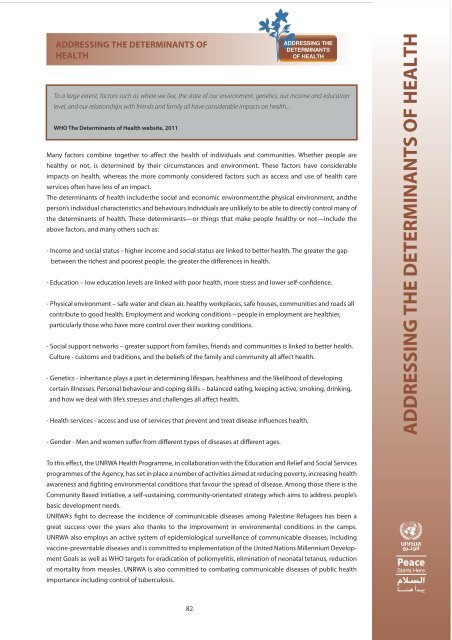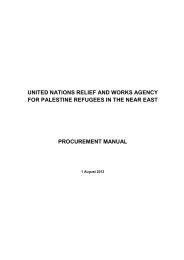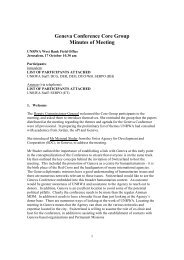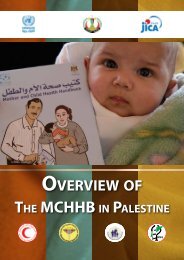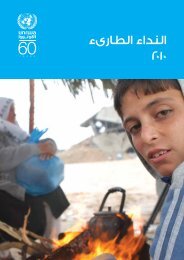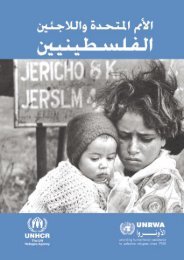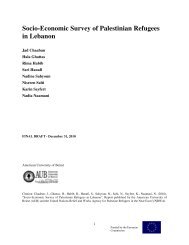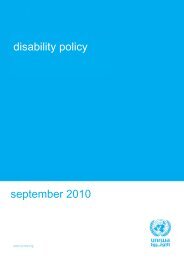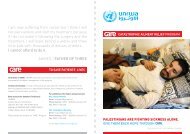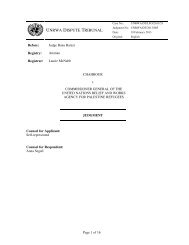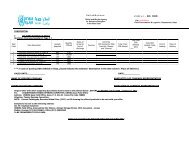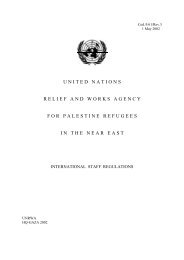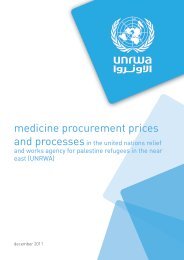Annual Report of the Department of Health 2010 - Unrwa
Annual Report of the Department of Health 2010 - Unrwa
Annual Report of the Department of Health 2010 - Unrwa
Create successful ePaper yourself
Turn your PDF publications into a flip-book with our unique Google optimized e-Paper software.
ADDRESSING THE DETERMINANTS OF<br />
HEALTH<br />
To a large extent, factors such as where we live, <strong>the</strong> state <strong>of</strong> our environment, genetics, our income and education<br />
level, and our relationships with friends and family all have considerable impacts on health...<br />
WHO The Determinants <strong>of</strong> <strong>Health</strong> website, 2011<br />
Many factors combine toge<strong>the</strong>r to affect <strong>the</strong> health <strong>of</strong> individuals and communities. Whe<strong>the</strong>r people are<br />
healthy or not, is determined by <strong>the</strong>ir circumstances and environment. These factors have considerable<br />
impacts on health, whereas <strong>the</strong> more commonly considered factors such as access and use <strong>of</strong> health care<br />
services <strong>of</strong>ten have less <strong>of</strong> an impact.<br />
The determinants <strong>of</strong> health include:<strong>the</strong> social and economic environment,<strong>the</strong> physical environment, and<strong>the</strong><br />
person’s individual characteristics and behaviours.Individuals are unlikely to be able to directly control many <strong>of</strong><br />
<strong>the</strong> determinants <strong>of</strong> health. These determinants—or things that make people healthy or not—include <strong>the</strong><br />
above factors, and many o<strong>the</strong>rs such as:<br />
- Income and social status - higher income and social status are linked to better health. The greater <strong>the</strong> gap<br />
between <strong>the</strong> richest and poorest people, <strong>the</strong> greater <strong>the</strong> differences in health.<br />
- Education – low education levels are linked with poor health, more stress and lower self-confidence.<br />
- Physical environment – safe water and clean air, healthy workplaces, safe houses, communities and roads all<br />
contribute to good health. Employment and working conditions – people in employment are healthier,<br />
particularly those who have more control over <strong>the</strong>ir working conditions.<br />
- Social support networks – greater support from families, friends and communities is linked to better health.<br />
Culture - customs and traditions, and <strong>the</strong> beliefs <strong>of</strong> <strong>the</strong> family and community all affect health.<br />
- Genetics - inheritance plays a part in determining lifespan, healthiness and <strong>the</strong> likelihood <strong>of</strong> developing<br />
certain illnesses. Personal behaviour and coping skills – balanced eating, keeping active, smoking, drinking,<br />
and how we deal with life’s stresses and challenges all affect health.<br />
- <strong>Health</strong> services - access and use <strong>of</strong> services that prevent and treat disease influences health.<br />
- Gender - Men and women suffer from different types <strong>of</strong> diseases at different ages.<br />
ADDRESSING THE<br />
DETERMINANTS<br />
OF HEALTH<br />
ADDRESSING THE DETERMINANTS OF HEALTH<br />
To this effect, <strong>the</strong> UNRWA <strong>Health</strong> Programme, in collaboration with <strong>the</strong> Education and Relief and Social Services<br />
programmes <strong>of</strong> <strong>the</strong> Agency, has set in place a number <strong>of</strong> activities aimed at reducing poverty, increasing health<br />
awareness and fighting environmental conditions that favour <strong>the</strong> spread <strong>of</strong> disease. Among those <strong>the</strong>re is <strong>the</strong><br />
Community Based Initiative, a self-sustaining, community-orientated strategy which aims to address people’s<br />
basic development needs.<br />
UNRWA’s fight to decrease <strong>the</strong> incidence <strong>of</strong> communicable diseases among Palestine Refugees has been a<br />
great success over <strong>the</strong> years also thanks to <strong>the</strong> improvement in environmental conditions in <strong>the</strong> camps.<br />
UNRWA also employs an active system <strong>of</strong> epidemiological surveillance <strong>of</strong> communicable diseases, including<br />
vaccine-preventable diseases and is committed to implementation <strong>of</strong> <strong>the</strong> United Nations Millennium Development<br />
Goals as well as WHO targets for eradication <strong>of</strong> poliomyelitis, elimination <strong>of</strong> neonatal tetanus, reduction<br />
<strong>of</strong> mortality from measles. UNRWA is also committed to combating communicable diseases <strong>of</strong> public health<br />
importance including control <strong>of</strong> tuberculosis.<br />
82


